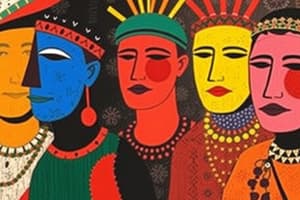Podcast
Questions and Answers
What is Culture Shock?
What is Culture Shock?
What is Ethnography?
What is Ethnography?
What are Informants (fixers)?
What are Informants (fixers)?
People who are a part of the culture and explain cultural nuances to outsiders.
Anthropology is the study of ________ experience.
Anthropology is the study of ________ experience.
Signup and view all the answers
Cultural Relativism is judging others by your own cultural standards.
Cultural Relativism is judging others by your own cultural standards.
Signup and view all the answers
Where did the Agta originate?
Where did the Agta originate?
Signup and view all the answers
Which group finds masks making their lives difficult?
Which group finds masks making their lives difficult?
Signup and view all the answers
What are the three values emphasized by the Agta?
What are the three values emphasized by the Agta?
Signup and view all the answers
What was one critical issue addressed by Anthropology in the 1970s?
What was one critical issue addressed by Anthropology in the 1970s?
Signup and view all the answers
What riddle has long puzzled evolutionary biologists?
What riddle has long puzzled evolutionary biologists?
Signup and view all the answers
Anthropological fieldwork is critical because it has helped build a much-needed community health ________.
Anthropological fieldwork is critical because it has helped build a much-needed community health ________.
Signup and view all the answers
Study Notes
Fieldwork and Ethnography
- Fieldwork involves first-hand information gathering.
- Ethnography produces reports based on the observations from fieldwork.
Cultural Concepts
- Culture Shock occurs when individuals feel out of place in unfamiliar cultural settings.
- Participant Observation requires engaging with a community to gain insights through activities and interactions.
- Informants (or fixers) are cultural insiders who explain cultural nuances to researchers.
Anthropological Subfields
- Applied Anthropology focuses on community projects to address specific cultural needs.
- Collaborative Anthropology emphasizes community involvement to ensure project sustainability.
- Paleoanthropology investigates human origins through genetics and fossils.
- Archaeology studies material culture, focusing on object significance.
Culture and Social Dynamics
- Culture encompasses learned behaviors and beliefs, enabling social networking and adaptability.
- Enculturation is the process by which individuals learn cultural norms.
- Sanctions can be external (loss of privileges) or internal (feelings of guilt) in response to norm violations.
Key Theoretical Concepts
- Reflexivity involves questioning personal beliefs and biases.
- Cultural Relativism promotes understanding other cultures from their own perspective.
- Ethnocentrism judges other cultures using one's cultural standards.
Symbols and Communication
- Dominant Discourse often reflects ethnocentric perspectives.
- Symbolic Communication is an abstract form of communication that signifies group belonging and reality manipulation.
- The Swastika symbolizes good luck in Sanskrit, while The Stainless Banner represents a specific socio-political identity.
Global Cultural Insights
- Modern behavior first emerged in Sub-Saharan Africa and Europe.
- Human children excel in social skills compared to other species.
- Deaf and Black communities report difficulties with facial masks in social contexts.
Cultural Groups
- The Tswana originate from Southern Africa.
- The Agta from the Philippines depict values of gender equality, friendship, and social acceptance through their stories.
Anthropological Developments in the 1970s
- Shift towards recognizing anthropologists as informants and updating the ethnographic present.
- Addressing issues of power, colonialism, and racism in cultural contexts.
- The evolution of universal education and its impact on cultural understanding.
Cooperative Behavior and Storytelling
- Evolutionary biologists study how humans learned cooperative behaviors essential for societal functioning.
- Stories play a crucial role in understanding human cooperation and societal norms.
Importance of Fieldwork in Health
- Anthropological fieldwork is essential for building community health resources and addressing local needs.
Studying That Suits You
Use AI to generate personalized quizzes and flashcards to suit your learning preferences.
Description
Test your knowledge of key concepts in cultural anthropology, including fieldwork, ethnography, culture shock, and participant observation. This quiz will help you understand these foundational terms and their importance in studying cultures.




